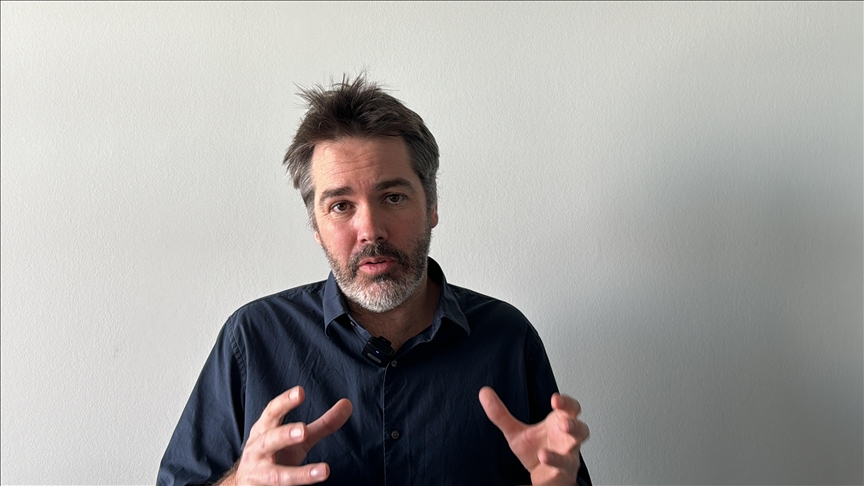Doctors Without Borders warns of 'systematic destruction' of health services in Gaza
Hunger being 'used as a weapon of war' in Gaza, Secretary-General Christopher Lockyear tells Anadolu

GENEVA
The secretary-general of Doctors Without Borders (MSF) said they have been witnessing the "systematic destruction" of health services in the Gaza Strip since Oct. 7, 2023.
Talking to Anadolu on the latest situation in Gaza under intense Israeli attacks, the difficulties encountered in health services and famine, Christopher Lockyear said: "There is a catastrophe across Gaza. We are particularly concerned about the situation in the north of Gaza, where we have almost no access.”
Highlighting that MSF was on the ground in Gaza before Oct. 7, he said that the residents of Gaza have been under blockade for the last 15 years.
Lockyear noted that the situation in Gaza has deteriorated rapidly since Hamas' "horrific" attacks in Israel on Oct. 7.
Stressing that the organization is "very concerned" about the situation of famine there, Lockyear said they are "incredibly worried" about what will happen if Israel launches a ground attack on Rafah in the south of Gaza, where 1.5 million people are currently taking refuge.
He also recalled that the health system in Gaza was in a deplorable state even before Oct. 7.
'High-quality medical care is impossible'
Lockyear noted the "systematic destruction" of health services in the Gaza Strip since Oct. 7, emphasizing that medical teams have been compelled to shift between hospitals due to evacuations.
Highlighting the challenging nature of treating patients with injuries that necessitate "high-quality medical care," he said: "It is extremely difficult, even impossible, to provide this level of care to patients in Gaza right now."
Lockyear said that they supported six health facilities, including three hospitals in the south and middle of Gaza, and "endeavored" to assist the staff at Al-Awda Hospital in the north.
Noting that MSF aided other hospitals in the north in the past and would like to expand its operations in the region, he said: "Access remains incredibly challenging."
"We genuinely seek access to provide treatment and support to the people in the northern region of Gaza," he added.
Pointing to the humanitarian restrictions in Gaza, Lockyear emphasized that they are "concerned" about images of airdrops of aid into Gaza and discussions about the construction of a temporary port for the delivery of aid by sea were "distracting attention from the real problem here."
'We need political solution'
"Aerial aid and the construction of a temporary port will not solve the situation in Gaza," Lockyear said, emphasizing a political solution.
He emphasized the necessity of a cease-fire to prevent indiscriminate bombing in Gaza and facilitate the flow of humanitarian aid.
"Healthcare workers must not endure intimidation or fear of indiscriminate bombing before they can deliver healthcare and humanitarian aid," he stated.
Lockyear stressed the importance of deploying qualified medical personnel for sustainable treatment and ensuring their safety in this regard.
For meaningful humanitarian assistance in Gaza, “we require far more access, resources, and security," he added.
Regarding the blockade Gaza has been facing in recent months, Lockyear expressed "extreme concern", noting increasing rates of "malnutrition" observed in health facilities.
'Hunger as a weapon'
Lockyear said: "We fear that hunger is being used as a weapon of war with this blockade. Our staff members report starvation and malnutrition affecting them and their families."
"We are extremely concerned that we cannot reach the people in the north of Gaza, where access is restricted," he added.
Highlighting the complexity of the situation in hospitals and health facilities, he emphasized the need for security and access to basic medical supplies to ensure high-quality medical care.
While acknowledging the impossibility of predicting the reconstruction of the health system in Gaza, Lockyear remarked: "We are currently in survival mode, striving to sustain our operations on a daily basis."
Israel has waged a deadly military offensive on Gaza since a cross-border incursion by the Palestinian group Hamas on Oct. 7, 2023 which killed nearly 1,200 people.
More than 31,700 Palestinians, mostly women and children, have since been killed in the enclave, and over 73,700 others injured amid mass destruction and shortages of necessities.
The Israeli war has pushed 85% of Gaza’s population into internal displacement amid a crippling blockade of most food, clean water and medicine, while 60%of the enclave's infrastructure has been damaged or destroyed, according to the UN.
Israel stands accused of genocide at the International Court of Justice. An interim ruling in January ordered Tel Aviv to stop genocidal acts and take measures to guarantee that humanitarian assistance is provided to civilians in Gaza.
*Writing by Muhammed Yasin Gungor from Istanbul
Anadolu Agency website contains only a portion of the news stories offered to subscribers in the AA News Broadcasting System (HAS), and in summarized form. Please contact us for subscription options.







